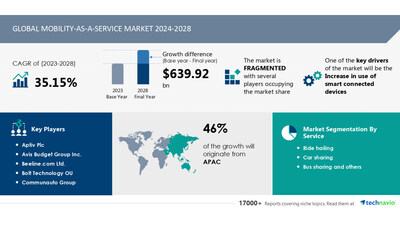Mobility-as-a-Service Market to Grow by USD 639.92 Billion (2024-2028) as AI Drives Market Transformation, Smart Device Usage Boosts Revenue - Technavio
PR Newswire
NEW YORK, Nov. 20, 2024
NEW YORK, Nov. 20, 2024 /PRNewswire/ -- Report with the AI impact on market trends - The global mobility-as-a-service market size is estimated to grow by USD 639.92 billion from 2024-2028, according to Technavio. The market is estimated to grow at a CAGR of almost 35.15% during the forecast period. Increase in use of smart connected devices is driving market growth, with a trend towards ride-sharing platforms and automotive companies exhibiting interest in MAAS. However, poor connectivity of devices poses a challenge.Key market players include Aptiv Plc, Avis Budget Group Inc., Beeline.com Ltd., Bolt Technology OU, Communauto Group, EAN Services LLC, Europcar Mobility Group SA, GoEuro Corp., Greenlines Technology Inc., GT Gettaxi UK Ltd., Hertz Systems Ltd. Sp. Z.o.o, Lyft Inc., MaaS Oy, Mercedes Benz Group AG, MOBIKO GmbH, Mobius Mobility LLC, movmi Shared Transportation Services Inc., Sway Mobility Inc., Tranzer BV, and Uber Technologies Inc..
AI-Powered Market Evolution Insights. Our comprehensive market report ready with the latest trends, growth opportunities, and strategic analysis- View Free Sample Report PDF
Forecast period | 2024-2028 |
Base Year | 2023 |
Historic Data | 2018 - 2022 |
Segment Covered | Service (Ride hailing, Car sharing, and Bus sharing and others), Vehicle Type (Cars, Buses, and Two-wheelers), and Geography (APAC, Europe, North America, Middle East and Africa, and South America) |
Region Covered | APAC, Europe, North America, Middle East and Africa, and South America |
Key companies profiled | Aptiv Plc, Avis Budget Group Inc., Beeline.com Ltd., Bolt Technology OU, Communauto Group, EAN Services LLC, Europcar Mobility Group SA, GoEuro Corp., Greenlines Technology Inc., GT Gettaxi UK Ltd., Hertz Systems Ltd. Sp. Z.o.o, Lyft Inc., MaaS Global Oy, Mercedes Benz Group AG, MOBIKO GmbH, Mobius Mobility LLC, movmi Shared Transportation Services Inc., Sway Mobility Inc., Tranzer BV, and Uber Technologies Inc. |
Key Market Trends Fueling Growth
The Mobility-as-a-Service (MaaS) market is experiencing significant growth due to increasing transportation needs in population-dense areas. Technology plays a crucial role, with ride-sharing, car-sharing, bike commuting, and public transport becoming more popular. Smart cities prioritize carbon dioxide reduction and consumer trust by providing wireless connection and internet connectivity through smartphones. Traffic jams and parking management are addressed with real-time journey planning and payments. Electric vehicles and charging stations are essential infrastructure for green cities. Businesses develop innovative solutions, such as the RMVgo app for ticket purchasing and CitySwift in Ireland for traffic congestion management. Government support for 5G and 4G LTE networks, along with telecom providers, enhances connectivity. The health crisis highlights the need for energy-efficient and cost-efficient transportation modes. Commercial and personal vehicles adapt to these trends, with funding uncertainty for public transport operators. Overall, MaaS offers a sustainable, efficient, and convenient solution for various transportation modes in traffic-congested areas.
Several major companies in the transportation industry are expanding their offerings to include Mobility-as-a-Service (MaaS) solutions. Uber Technologies Inc. Acquired JUMP Bikes in April 2018 to develop their mobile app into a multimodal platform, offering seamless access to car-hailing/sharing, bike-sharing, and public transit networks. Daimler AG and BMW AG are also investing in MaaS platforms through their subsidiaries, such as Daimler's Moovel Group GmBH, founded in 2015. These companies aim to provide integrated and convenient mobility solutions for consumers.
Insights on how AI is driving innovation, efficiency, and market growth- Request Sample!
Market Challenges
- The Mobility-as-a-Service (MaaS) market is experiencing significant growth, with transportation, technology, population growth, and consumer preferences driving demand. Challenges include ride sharing, car sharing, bike commuting, public transport, trains, and smart cities, all requiring seamless integration. Carbon dioxide reduction is a priority, with trust and consumer convenience key factors. Wireless connection and internet connectivity via smart phones are essential for real-time journey planning and payments. Traffic jams, parking management, and accidents are major issues, requiring government support and infrastructure development. Electric vehicles and charging stations, 5G and 4G LTE, and telecom partnerships are important for energy-efficient and cost-efficient transportation modes. Public transport operators face funding uncertainty and must adapt to changing travel patterns. The RMVgo app simplifies ticket purchasing, while taxis, car-sharing, scooters, and bike-sharing offer alternatives in traffic-congested areas. Health crises add complexity, requiring innovative solutions.
- In the Mobility-as-a-Service (MaaS) market, connected transportation devices pose unique challenges. These devices consume significant power and Internet bandwidth. Ensuring seamless connectivity for multiple devices simultaneously requires high-bandwidth connections. Transportation devices, such as vehicles equipped with sensors, necessitate expensive Internet plans with high bandwidth. Vendors must implement MaaS solutions that minimize bandwidth usage through network traffic management systems. Retrieving data from cloud-based systems necessitates increased bandwidth for efficient data transfer.
Insights into how AI is reshaping industries and driving growth- Download a Sample Report
Segment Overview
This mobility-as-a-service market report extensively covers market segmentation by
- Service
- 1.1 Ride hailing
- 1.2 Car sharing
- 1.3 Bus sharing and others
- Vehicle Type
- 2.1 Cars
- 2.2 Buses
- 2.3 Two-wheelers
- Geography
- 3.1 APAC
- 3.2 Europe
- 3.3 North America
- 3.4 Middle East and Africa
- 3.5 South America
1.1 Ride hailing- Ride-hailing services, such as Uber and Lyft, offer consumers flexible and affordable transportation solutions through their mobile apps. The increasing cost of owning a private car and limited parking space have led to an increase in the number of people opting for ride-hailing services. Major operators invest heavily in advertising to boost brand awareness, reducing waiting times and offering real-time location updates through global positioning systems. Innovative pricing algorithms, improved customer service, and user-friendly apps have made ride-hailing popular among Millennials. Urbanization and rising disposable income have also contributed to the growth of this market segment, driving the expansion of the global mobility-as-a-service market.
Download complimentary Sample Report to gain insights into AI's impact on market dynamics, emerging trends, and future opportunities- including forecast (2024-2028) and historic data (2018 - 2022)
Research Analysis
Mobility-as-a-Service (MaaS) is revolutionizing the way we move in cities around the world. This innovative transportation model integrates various modes of transportation, including ride sharing, car sharing, bike commuting, public transport, trains, and electric vehicles, into a single digital platform. The population's growing demand for sustainable and efficient transportation solutions is driving the market's growth. Technology plays a crucial role in MaaS, with 5G and 4G LTE networks enabling real-time journey planning, payments, and infrastructure utilization. Smart cities are also investing in Wi-Fi and other telecom infrastructure to support MaaS. However, consumer trust is essential for the success of MaaS. Providing a seamless and safe journey experience is key. The lack of consumer awareness and knowledge about MaaS is a challenge that must be addressed through targeted marketing and education. Infrastructure development is another critical factor. Governments and private companies must invest in the necessary infrastructure to support MaaS, including charging stations for electric vehicles and bike lanes. MaaS also offers the potential for significant reductions in carbon dioxide emissions, making it an attractive option for consumers and governments alike. The future of transportation is green, and MaaS is leading the way.
Market Research Overview
The Mobility-as-a-Service (MaaS) market is revolutionizing transportation by integrating various modes of travel into a single, seamless experience. This technology-driven approach caters to the needs of a growing population, offering alternatives to traditional personal vehicles. Ride sharing, car sharing, bike commuting, and public transport are key components, with trains and smart cities also playing a significant role. Carbon dioxide reduction is a major focus, as consumers increasingly value trust, time efficiency, and wireless connectivity. Smart phones and internet connectivity are essential tools for journey planning, ticket purchasing, and real-time traffic updates. Infrastructure development, including charging stations for electric vehicles and parking management systems, is crucial. Government support, 5G and 4G LTE networks, and green city initiatives are also driving the market forward. The MaaS market is energy and cost efficient, addressing the challenges of traffic jams, accidents, and funding uncertainty in commercial and private vehicles. The market encompasses various transportation modes, including commercial vehicles, scooters, and bike-sharing, and aims to provide a more utilitarian, personalized, and energy-efficient transportation experience. The health crisis has further emphasized the importance of MaaS in reducing the need for public transport and minimizing exposure to crowded areas. Public transport operators are collaborating with tech companies to provide more efficient and convenient services, with apps like RMVgo leading the way in ticket purchasing and journey planning. The market's potential is vast, with the promise of a more connected, efficient, and sustainable transportation future.
Table of Contents:
1 Executive Summary
2 Market Landscape
3 Market Sizing
4 Historic Market Size
5 Five Forces Analysis
6 Market Segmentation
- Service
- Ride Hailing
- Car Sharing
- Bus Sharing And Others
- Vehicle Type
- Cars
- Buses
- Two-wheelers
- Geography
- APAC
- Europe
- North America
- Middle East And Africa
- South America
7 Customer Landscape
8 Geographic Landscape
9 Drivers, Challenges, and Trends
10 Company Landscape
11 Company Analysis
12 Appendix
About Technavio
Technavio is a leading global technology research and advisory company. Their research and analysis focuses on emerging market trends and provides actionable insights to help businesses identify market opportunities and develop effective strategies to optimize their market positions.
With over 500 specialized analysts, Technavio's report library consists of more than 17,000 reports and counting, covering 800 technologies, spanning across 50 countries. Their client base consists of enterprises of all sizes, including more than 100 Fortune 500 companies. This growing client base relies on Technavio's comprehensive coverage, extensive research, and actionable market insights to identify opportunities in existing and potential markets and assess their competitive positions within changing market scenarios.
Contacts
Technavio Research
Jesse Maida
Media & Marketing Executive
US: +1 844 364 1100
UK: +44 203 893 3200
Email: media@technavio.com
Website: www.technavio.com/
![]() View original content to download multimedia:https://www.prnewswire.com/news-releases/mobility-as-a-service-market-to-grow-by-usd-639-92-billion-2024-2028-as-ai-drives-market-transformation-smart-device-usage-boosts-revenue---technavio-302311072.html
View original content to download multimedia:https://www.prnewswire.com/news-releases/mobility-as-a-service-market-to-grow-by-usd-639-92-billion-2024-2028-as-ai-drives-market-transformation-smart-device-usage-boosts-revenue---technavio-302311072.html
SOURCE Technavio



